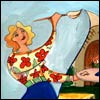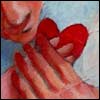
On Yom Kippur we ask forgiveness for what we have done; not who we are. Our sins and our Self-Imposed Nonsense are the actions that get in the way between us and G‑d. There are certain things about our personalities that give rise to self-destructive behavior. The Talmud says that the only way we could do anything contrary to G‑d’s will is because we are under the influence of a state of “folly” or “nonsense.”
Over the year we have done plenty of things that cause dirt to gather on our precious soul. The challenge is to communicate this to the struggling addict: That the dirt is acquired and not what defines us. We may be dirty, but we are not dirt!
How to get this message across to the people I work with, people suffering from addiction, is not only a challenge — but it is the main challenge. There is so much self-loathing that they find it impossible to believe that G‑d wants a new and intimate relationship. Addicts are usually filled with shame and guilt. Guilt is healthy and necessary for the recovery process to take place. Shame is different. It is not a regret of what I have done; it is a regret of who I am. "I am bad" vs. "what I have done in the past is wrong." The difference is that our character faults cannot define who we intrinsically are.
The essence of who we are remains unaffected; it needs dusting. And that’s what Yom Kippur does. It’s the annual buffing of the soul. The soul, like the diamond, always remains precious.
Recovering from addiction includes being able to see ourselves rightly. It is distorted thinking that can cause a person to continue to use. One of the thoughts that is so dangerous is that “I am bad.” This thinking takes on a life of its own. It’s called shame-based self-perception. I see myself as my actions and that’s it. But, in reality, I am so much more than my actions and my speech — and even more than my thoughts.
I need to own my own dirt. I need to go over all the actions that need cleansing. I also need to see myself as a diamond. My character defects are acquired; they are not me.
On Yom Kippur we stand before G‑d. We have looked at ourselves rightly; we have repented and committed to a positive future. Our Creator now embraces us as only a parent can embrace a child.
Our true essence shines. The angels dance, and the world rejoices. And, finally, I am okay being me.





